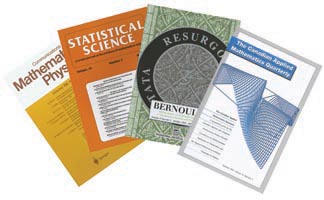Libraries turn publishers to sidestep high costs of academic magazines
By Ross Atkinson

Academic research libraries exist to ensure that scholarly information needed for learning and research is readily accessible to both present and future generations of scholars and students. For the most part, what libraries make available are the end products of a formal publishing process -- books and journal articles (both increasingly in electronic form), as well as other resources such as visual media and databases.
In recent years, however, increased prices and extreme pricing policies adopted by some publishers have forced libraries to trim their budgets. Now that it has become too costly to provide users with access to some key scholarly information, many research libraries have begun working with faculty and with not-for-profit publishers, especially society publishers and university presses, on alternative methods to publish scholarly information.
Cornell University Library (CUL) is among several large academic research libraries that now operate their own publishing offices to produce high-quality scholarly publications, either by working with local researchers or by partnering with other publishers. For example, over the past five years CUL's Project Euclid has supported a range of publishers in helping them make their mathematics and statistics journals accessible online at a reasonable price http://projecteuclid.org.
While the excessively high prices now being charged by some (primarily commercial) publishers is a powerful motivation for seeking alternatives to traditional scholarly publishing, research libraries are equally concerned about finding ways of increasing access to these publications and ensuring that they will remain accessible for the long term.
In May 2005 the Cornell Faculty Senate passed a resolution encouraging faculty to become familiar with the pricing policies of peer-reviewed journals in their specialty and to stop submitting papers to, or refereeing for, journals sold by publishers who charge exorbitant subscription fees (see http://www.library.cornell.edu/scholarlycomm/resolution.html). The resolution also endorsed alternative publishing methods, such as open-access journals, retaining some copyright, and placing copies of publications in open-access repositories.
During this academic year, library staff members are visiting academic departments to discuss these issues and the services CUL offers to help faculty take advantage of new and alternative publishing methods. Perhaps the most basic action researchers can take is to retain some publishing rights for their own scholarly work. This can be done by transferring only "nonexclusive" rights to publishers in the copyright contract. For example, authors can negotiate to retain the rights to use the publication for teaching purposes, publish it elsewhere, make a copy freely available for e-reserves or for course packs, as well as the right to add the publication to an open-access repository so that it will be freely accessible to users on the Internet. (A sample addendum to copyright agreements for journal articles is available at http://www.arl.org/sparc/author/addendum.html.)
Some publishers will allow authors to place a preliminary draft of an article (which may be different from the article in its final form) in an open-access repository. Others will permit the final copy to be made available free online at a specified time following initial publication. The National Institutes of Health (NIH) has asked researchers to add articles reporting on projects funded by NIH to its open access repository, PubMedCentral http://www.pubmedcentral.nih.gov within 12 months of the original publication.
Placing a publication in an online repository not only ensures that the information is more accessible to other scholars, but also that it will remain available for the long term -- especially if the repository is managed by an academic library. If the public copy is available only on a publisher's server, technical or economic problems can jeopardize the continued availability of the publication.
CUL currently manages two open-access repositories: DSpace, an institutional repository for use by all Cornell faculty, students and staff http://dspace.library.cornell.edu, and the arXiv, a disciplinary repository for publications in physics, computer science, mathematics and computational biology http://arxiv.org. Founded in 1991 by Cornell physics professor Paul Ginsparg when he was working at Los Alamos National Laboratory, arXiv is the world's most successful disciplinary repository.
CUL aims to remain a key player in the scholarly information exchange process and is committed to working with scholars, publishers and other libraries to review and, if necessary, revise the process by which the fruits of teaching and research are made available.
Ross Atkinson is Cornell's associate university librarian for collections.
Media Contact
Get Cornell news delivered right to your inbox.
Subscribe